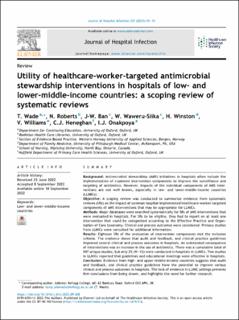| dc.contributor.author | Wade, T. | |
| dc.contributor.author | Roberts, N. | |
| dc.contributor.author | Ban, Jong-wook | |
| dc.contributor.author | Waweru-Siika, Wangari | |
| dc.contributor.author | Winston, H. | |
| dc.contributor.author | Williams, V. | |
| dc.contributor.author | Heneghan, C. J. | |
| dc.contributor.author | Onakpoya, I. J. | |
| dc.date.accessioned | 2023-04-18T10:30:38Z | |
| dc.date.available | 2023-04-18T10:30:38Z | |
| dc.date.created | 2023-01-13T16:09:21Z | |
| dc.date.issued | 2023 | |
| dc.identifier.citation | Journal of Hospital Infection. 2023, 131, 43-53. | en_US |
| dc.identifier.issn | 0195-6701 | |
| dc.identifier.uri | https://hdl.handle.net/11250/3063531 | |
| dc.description.abstract | Background
Antimicrobial stewardship (AMS) initiatives in hospitals often include the implementation of clustered intervention components to improve the surveillance and targeting of antibiotics. However, impacts of the individual components of AMS interventions are not well known, especially in low- and lower-middle-income countries (LLMICs).
Objective
A scoping review was conducted to summarize evidence from systematic reviews (SRs) on the impact of common hospital-implemented healthcare-worker-targeted components of AMS interventions that may be appropriate for LLMICs.
Methods
Major databases were searched systematically for SRs of AMS interventions that were evaluated in hospitals. For SRs to be eligible, they had to report on at least one intervention that could be categorized according to the Effective Practice and Organisation of Care taxonomy. Clinical and process outcomes were considered. Primary studies from LLMICs were consulted for additional information.
Results
Eighteen SRs of the evaluation of intervention components met the inclusion criteria. The evidence shows that audit and feedback, and clinical practice guidelines improved several clinical and process outcomes in hospitals. An unintended consequence of interventions was an increase in the use of antibiotics. There was a cumulative total of 547 unique studies, but only 2% (N=12) were conducted in hospitals in LLMICs. Two studies in LLMICs reported that guidelines and educational meetings were effective in hospitals.
Conclusion
Evidence from high- and upper-middle-income countries suggests that audit and feedback, and clinical practice guidelines have the potential to improve various clinical and process outcomes in hospitals. The lack of evidence in LLMIC settings prevents firm conclusions from being drawn, and highlights the need for further research. | en_US |
| dc.language.iso | eng | en_US |
| dc.publisher | Elsevier | en_US |
| dc.rights | Attribution-NonCommercial-NoDerivatives 4.0 Internasjonal | * |
| dc.rights.uri | http://creativecommons.org/licenses/by-nc-nd/4.0/deed.no | * |
| dc.title | Utility of healthcare-worker-targeted antimicrobial stewardship interventions in hospitals of low- and lower-middle-income countries: a scoping review of systematic reviews | en_US |
| dc.type | Peer reviewed | en_US |
| dc.type | Journal article | en_US |
| dc.description.version | publishedVersion | en_US |
| dc.rights.holder | © 2022 The Authors. | en_US |
| dc.source.pagenumber | 43-53 | en_US |
| dc.source.volume | 131 | en_US |
| dc.source.journal | Journal of Hospital Infection | en_US |
| dc.identifier.doi | 10.1016/j.jhin.2022.09.008 | |
| dc.identifier.cristin | 2106838 | |
| cristin.ispublished | true | |
| cristin.fulltext | original | |
| cristin.qualitycode | 1 | |

